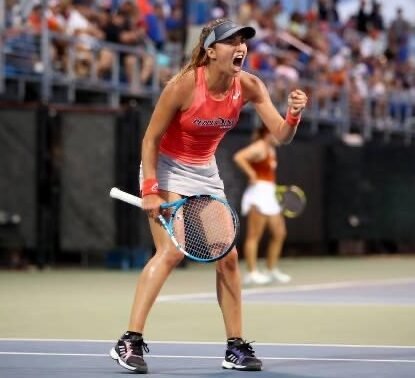If you ask Jessica Failla how she got into tennis, she’ll paint you a picture far removed from stadium lights and red carpets. “I grew up in the ball basket,” she says, laughing. Born into the game—both her parents were professional players—Failla’s path to the pro tour was less a decision and more a birthright.
Her father, once ranked No. 249 in the world, and her mother, a standout in collegiate tennis, made the courts a 2nd home. “By the time I could walk is when I started playing, and since I was a young girl, I’ve wanted to play professionally”, she adds.
At 27, Failla is now carving her own space in the sport—not on the glitzy stages of Grand Slams (yet), but through the relentless grind of the ITF Tour, a world many tennis fans know little about, and even fewer understand. Failla’s story so far, is one that highlights both the positives, and the challenges that come with life outside the tennis spotlight.
From Pepperdine Peaks to Professional Reality Checks
Failla’s tennis pedigree came into full bloom at Pepperdine University, one of the top collegiate programs in the U.S. There, she thrived. “My coaches helped me so much develop my game to being more of an aggressive player,” she says. She rose as high as No. 4 in the college rankings and helped lead her team to the NCAA finals. Turning pro felt like a natural next step.
But natural doesn’t mean easy.
“I beat 4 or 5 top 200 girls in my first 4 events. I think I underestimated a little bit how difficult pro tennis is,” Failla reflects. “In college I was used to maybe losing 3 or 4 matches a year. On the ITF circuit, you can lose every single week.”
The reality of starting over hit hard.
“I’ve won 1 ITF event in singles, and in college I was used to maybe losing 3, 4 matches a year. The biggest part of growth for me is learning how to deal with losing, to have a positive mindset, and to be able to go out and compete and do your best, when you might have lost your last 4 matches.
That’s something I never had to deal with. All throughout juniors and college tennis I was used to having a lot of success. That has been a big challenge having to deal with that. I think I’ve grown so much as person playing the ITF circuit.”
The Grind of the ITF Circuit
To the casual fan, professional tennis conjures images of Wimbledon whites and 5-star accommodation. But much of the tour—the ITF level especially—is built on far humbler foundations. For Failla, the contrast has been both character-building and, at times, disconcerting.
She recounts one such experience at a 75K event in Pune, India earlier this year. “The hotel was $35 a night, very dirty, my door didn’t lock, there were mosquitos in the room, no toilet paper, no towels,” she says. “I was alone, I was scared.”
On court conditions in India weren’t a whole lot better. Failla reflects on the New Delhi 50K event…
“I think the 2nd day I was there, I had a 9 a.m. practice, and you could not see from one baseline to the other. You couldn’t see the tennis ball until it crossed your side of the net. We were coughing a lot, it was very hard to breathe, and not good for your health. But obviously you spend a lot of money to get to India and play this pro tournament, so I try to do my best.

There were a lot of monkeys, and the umpire told us to we need to make sure our bananas were put in the coolers, or the monkeys would come and get them. I’m thankful I didn’t get any sicknesses.”
And yet, it wasn’t her own discomfort that left an impact—it was the human reality around her. “There were so many people starving and struggling that didn’t have a place to live. It was very eye-opening. Seeing poverty on that scale was life-changing.”
Conditions on the ITF circuit are notoriously inconsistent, from wild monkeys in India to 5-day rain delays in the Dominican Republic. The obstacles however, are constant.
“The first match was supposed to be on Monday, and it rained so much we weren’t able to play the 1st Rd. until Friday. It was very, very hot and humid there when the rain would stop. And obviously, you haven’t been able to practice much. Then I won my first match and had to play again that same day to make up, because of the weather. I won the 1st set, and was up in the 2nd set, but started full body cramping and eventually lost the match.
I think, there’s a lot of different variables with pro tennis, things that I didn’t realize I would have to deal with, and I’m constantly trying to problem solve and figure out how I can do my best, and how I can’t let my results affect me.”
Yet, through it all, Failla uses her faith to remain grounded, and get through the challenges that appear. “I’m a Christian, so I really try to view tennis as an opportunity to be a shining light for Jesus,” she shares. “If I let who I am, be defined by my wins or how nice an event is, my life would be a total roller coaster. I think that’s where my faith in God really comes in, and finding my identity in that rather than my results, has really helped me.”
The Doubles Breakthrough
Failla’s tennis journey has recently taken an exciting turn—not through singles, as she’d long imagined—but through doubles. In August 2024, she found herself as a last-minute alternate at the WTA 125 in Barranquilla, Colombia.
“I was an alternate in doubles at a WTA 125. I was there for the singles. It was only my second ever WTA event, and I ended up getting into the tournament with my partner, and we won the title, which was just crazy. A week later, I found out I got a US Open wildcard to play doubles.

That’s just really what started me focusing on doubles,” she says. “At that time, I was ranked around 400 in doubles. Now I’m around 144. It’s been really exciting and fun.”
In 2025, that momentum has only accelerated. Partnering with Jessie Aney, Failla has already captured titles at the W50 in Chihuahua and the W100 in Bengaluru. That surge has catapulted her from No. 215 to a career-high 144 in the rankings, and she’s not done yet.
Physically, the switch has helped too. “Singles is tough, playing day in, day out. Doubles has been really fun and a bit easier on the body,” she admits.
“It’s been really fun playing with a good friend. I’m not sure where my tennis journey will go from here. I’m just trying to do my best every single day, and we’ll see where it all leads.”
A Voice for Change
With experience across continents and tiers, Failla is uniquely positioned to speak on the state of the ITF and doubles tours—and what needs to change.
She’s not asking for luxury. “At a $25K, it doesn’t need to be like Wimbledon,” she says. “I just think there needs to be a basic standard of cleanliness for the hotel and transportation for people to be safe. Making sure your door locks in the hotel room and just for it to be a safe environment, where people feel like they really can do their best at the Challengers. I think that’s really important”
She also believes the lack of tournaments creates a logistical bottleneck. “I think the biggest thing to help the tour is just to have more tournaments. Having more tournaments helps to spread out all of the players.”
As for doubles, Failla sees immense untapped potential. “Doubles is super exciting and fun to watch,” she says.
However, if there was 1 change Failla would make, it’s the scheduling of matches.
“When the matches are scheduled at a good time, a lot of people come out and watch. During the WTA 250 in Austin, Texas, we had 4 or 500 people come out and watch. I’ve also been to Indian Wells, and seen doubles matches on while the men’s semi-finals are being played, and there’s 4 or 5 people watching. So I think when the matches are scheduled is really important. “
One of the other big issues, is the points discrepancy. This is something that has been an issue on both the men’s and women’s tour for a while, and Failla definitely sees some problems with the way things are structured currently.
“I think so much of tennis is finding a way to be able to get your ranking up to get into the bigger tournaments to give yourself a really good chance to get more points, and really be able to move up, break through, and make money”
Failla goes on to point out that she played a team at a WTA 250, having previously competed against them in a 50K earlier in the year. The level is similar, but winning one match at a WTA gets you 50 points—the same as winning an entire ITF 50K. The structure makes it so hard to break through, unless you get lucky, or catch fire for a few weeks.
The Bigger Picture
Failla knows she’s in a privileged position. Her college education, family support, and recent doubles success have given her perspective many players don’t have access to. But she’s also still a professional tennis player, and is constantly trying to gain a better ranking, and be a better player. But at the end of the day, that number is just a number, and isn’t a defining criterion.
“I think a big thing for me was in college, my highest ranking was number 4 in the country. Seeing that number 4 by my name, it just seemed such a great number. Whereas in pro tennis, my highest ranking in singles has been around 420. And that number just doesn’t sound very good to me. But, to be 420 out of all the tennis players in the world, it’s an amazing accomplishment. I think that’s where I’ve had to focus on. I need to find my identity as a person outside of this sport.”
That humility and introspection underpin everything Failla does. “You never know what’s going to happen in tennis,” she says. “But I’m very blessed to be on this journey.”
From packed stadiums to crumbling hotel rooms, from US college glory to fog-choked courts in Delhi, Jessica Failla is still finding joy in the journey. As she continues her push through the doubles ranks, Failla isn’t just playing on the tour, she’s living her life on it.
Read more exclusive articles about players on the ITF Tour and ATP Challenger Tours here.
Follow The Tennis Site on Facebook and X: @thetennissite
Follow Todd Scoullar on X: @toddscoullar


Comments are closed, but trackbacks and pingbacks are open.